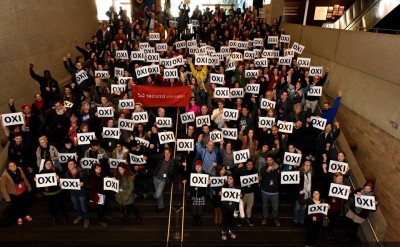For the last five years, Greece has been subject to a series of harsh austerity measures imposed by the Troika (the IMF, ECB, and European Commission) in exchange for loans that, in many cases, have been used for little more than repaying existing loans. These austerity measures follow the tried-and-tested neoliberal readjustment programmes we’ve seen elsewhere over the past 30 years – the slashing of pensions, reduction of the minimum wage, the sell-off of state assets (such as ports and utilities), the deregulation of goods, services and energy markets, cuts across the public services, and the laying-off of public sector workers.
These neoliberal reforms have resulted in some rather predictable effects: more than a million Greeks have no access to healthcare, infant mortality and HIV rates are soaring, unemployment has reached more than 25% (and more than 50% amongst youth), homelessness has risen continuously, and hundreds of thousands of small businesses have been forced to close[1]. Distressingly – but unsurprisingly – studies have found a clear correlation between cuts to social spending and an increase in suicide[2]. Whilst the rise of Syriza has been a welcome response from ‘the Left’, the increasingly desperate situation in Greece has also fuelled the rise of the violent far-Right neo-Nazi group Golden Dawn, which polled third in the 2015 elections.
Given the increasingly severe consequences of the Troika-led austerity measures, it shouldn’t be a surprise that an estimated 61% of the Greek population voted OXI – No! – to the most recent austerity package. Yet this overwhelming rejection of the most recent austerity package remains a historically significant moment as, with the partial exception of Spain, neoliberal politics remains unopposed at the parliamentary level on a European-wide scale. Yet whilst internet memes of frightened-looking finance ministers and triumphant Greek grannies are abound, and whilst it’s clear the referendum signifies some form of opposition to the new normal of austerity, the meaning of OXI is less obvious to decipher.
As some commentators have noted over the past week, it is unclear the extent to which an OXI vote is a rejection of the European project in toto, a more specific rejection of the common currency or a variation thereof, a blanket rejection of the austerity politics imposed by the Troika, a symbolic act to signify that ‘something must change’, a principled refusal to be ‘financially blackmailed’ or ‘threatened’ into submitting to austerity, or simply a strategic vote to try and strengthen the negotiating position of Greek finance ministers. In reality, the OXI vote most likely prevailed due to a confusing blend of these factors, and there will be much disagreement amongst OXI voters on questions such as whether Greece should remain in the Eurozone or return to the drachma. The OXI vote in no way represents a coherent socio-political block, and any ‘catch-all’ explanation will undoubtedly obscure the complexity of the Greek political situation.
Although the Greek vote has been built on complex foundations, it’s significant that OXI has transformed from an option on a Greek ballot paper into a meme that has caught the imagination of people across Europe and beyond. The 40,000 strong Facebook group ‘Europe Says OXI’[3] reported solidarity actions from Turkey, Germany, Belgium, Hungary, Italy, Croatia, Luxembourg, France, Portugal, Austria, Spain, Poland, Switzerland and the UK – there was even a demonstration in Australia. Heat-maps of twitter activity show #OXI exploding across Europe, the US and Latin America as the results of Sunday’s referendum came in[4] – and I’m sure I’m not the only one to have been invited to a celebratory Ouzo-Oxi party.
One of the clearest examples of OXI departing from the complexity of its Greek roots can be found in the series of protests planned in response to today’s budget. With the UK Chancellor George Osborne expected to announce a series of further austerity measures, including the ‘reform’ of income tax credit and housing support, the protest group The People’s Assembly has announced that the slogan ‘“Oxi to Osborne” will be the placard of choice at demonstrations across the country’[5]. Undisturbed by many of the issues that have shaped the Greek OXI – the UK is not in the Eurozone, there is no bargaining position to be strengthened, nor is there the ‘oppressor/oppressed’ narrative that exists between the Troika and Syriza – the meaning of this ‘international’ OXI is equally unclear.
If OXI has become more than a vote on a Greek ballot paper, then what do we want the meaning of OXI to become? Utilized in the sense of the UK’s People’s Assembly, OXI is reduced down to the familiar ‘no’ to austerity. Stripped of political nuance and the complexities associated with the Greek context, this pared-down ‘OXI-lite’ is not noticeably different to the anti-austerity discourse we saw in London on June 20th, or indeed at almost every other ‘anti-austerity’ event over the past few years. In other words, shoehorned into the existing discourse, OXI-lite doesn’t offer us anything new at all.
Given the relatively uninspiring dead-end of returning to a simple ‘scream’ against austerity, perhaps the OXI that fuelled solidarity demonstrations in at least 15 different countries drew its inspiration from a different source – an OXI that was more than a simple ‘no’ to austerity, but an event that challenged the very foreclosure of political possibility that has dominated (at least) the last 25 years of Anglo-European political consciousness.
The hidden-hand of neoliberal logic that drives austerity is that ‘politics is over’ – or as Francis Fukuyama suggested in 1989, history itself had reached its conclusion. Rather than politics being about conscious decisions regarding the sort of collective social life we would like to live in – and the full-blooded arguments associated with this freedom to choose – ‘politics’ had become legitimate only to the extent that it is affordable. In other words, the act of deciding on collective social futures had been superseded by the act of balancing the books; ‘governance’ replaced beliefs, accountancy replaced imagination, and economic necessity replaced social possibility.
The heralded ‘return of democracy’ that some commentators have associated with the Greek OXI is thus considerably more than a rejection of the austerity measures that have immiserated the Greek people over the past five years. It is not a surprise that the Greek people are opposed to measures that have, in many cases, made life too much of a burden to be worth living. Yet this opposition can be found across Europe and further abroad, even if it all too infrequently spills beyond private concerns into the public outrage that it demands.
The meaning of OXI we should fight for is the belief in politics itself. OXI is the belief that we can throw off the demands of a supposedly ‘impartial’ economy that serves only the few, that we can reject the fallacy that ‘economic necessity’ demands something we consider socially unacceptable, and instead begin to make decisions about our own collective social life. It is precisely this that makes the Greek OXI vote inspiring, the potential for a return of politics, and the headaches and uncertainties and dangers of attempting to walk an unknown path.
Bert Russell
Plan C Manchester
[1] http://www.globalresearch.ca/the-greek-economic-crisis-the-social-impacts-of-austerity-debunking-the-myths/5431010
[2] http://www.theguardian.com/world/2014/apr/21/austerity-greece-male-suicides-spending-cuts
[3] https://www.facebook.com/solidaritywithgreece
[4] https://www.facebook.com/RTnews/videos/10153509448249411/
[5] http://www.theguardian.com/uk-news/2015/jul/07/budget-osborne-campaigners-protest-demonstrations-die-in?utm_source=dlvr.it&utm_medium=twitter







